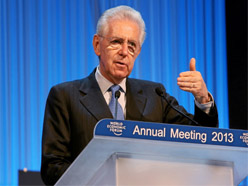
European leaders agreed that they must follow through on decisions made at countless European Council meetings in Brussels and move immediately to complete the single market and conclude free trade agreements, says a World Economic Forum news release.
Speaking during the World Economic Forum’s Annual Meeting, leaders of Ireland, Italy, Denmark and the Netherlands expressed optimism about Europe’s prospects, while discussing how tough reforms are positioning their countries to achieve growth and tackle the burgeoning unemployment that is undermining prosperity and discouraging citizens. Tough reforms across the board include pension and tax reform, structural economic reforms, labour market flexibility, streamlined bureaucracies and deep budget cuts.
Ireland has been through a “hurricane”, acknowledged Enda Kenny, Taoiseach [prime minister] of Ireland.
“Our people have had to face very serious challenges. If a government works with its people… and [understands] the patience of people to put up with changes… results will flow,” said Kenny.
At the same time, the Irish people’s faith in the EU is steadfast. In 2011, they voted 60% to stay in the Eurozone in a referendum on the EU’s Financial Stability Mechanism. “We’ve been married to Europe for 40 years now… We have made our decision to be clearly linked to the Eurozone,” Kenny affirmed.
Read: WEF founder Schwab fears economic collapse
Italy’s response to the pressures of the “financial emergency” is to inject more competition and openness in the markets. “This is totally in line with the EU’s inspiration of a social market economy,” explained Mario Monti, prime minister of Italy.
“We did this by securing the sustainability of public finances in the long term, including tough pension reform, and looking at the factors that drive growth.” Monti noted that no country in Europe can keep or resume growth unless EU policies are oriented towards growth. “We have been pushing at the European Council for a growth pact and insisting daily that the single market be taken more seriously,” he said.
Helle Thorning-Schmidt, prime minister of Denmark, said her government is in a “reform frenzy”.
“We need to change in a structural way to maintain what we like so much about Europe, while maintaining what makes Europe special – our social market economy, our focus on the environment and climate issues, our democracy, human rights and equality. In the coming years, we need to change but keep our core values,” she said. “[It’s time] to recognize where we are frontrunners and use this to give us a competitive advantage globally. We need to move on the practical issues right now.”
Read: WEF: Bankers launch charge against tighter regulations
The Dutch reform program is based on running a tight ship and implementing tough reforms. “[Now] we need to get the economic engine going,” said Mark Rutte, prime minister and minister of general affairs of the Netherlands.
“If [European leaders] would implement everything they have previously agreed to, we would have 4% more GDP in the next 10 years.” Rutte said it is time for member states to implement reforms, exercise fiscal disciple and get public finances in order. “Our aim should be to have the whole Eurozone intact,” he said.
The single market is far from complete, particularly in the area of services, digital services and energy. Free trade agreements with Canada, Japan and Singapore must be pursued.
Rutte declared it is “crazy” that an agreement with the United States is not already in place. “Europe and the US have a strong partnership,” he said. Kenny said that if the largest trading bloc on Earth, the EU, can set the roadmap for an agreement with the US, it will be a “big signal”.